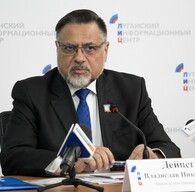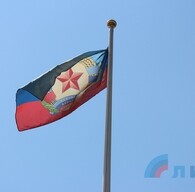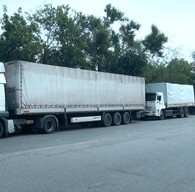Ukrainian representatives in the Contact Group subgroup on political settlement issues refused to discuss the Donbass Republics’ proposals on the Road Map for settling the Donbass conflict, press secretary of the Lugansk People’s Republic delegation in the Contact Group Maria Kovshar said following the video conference of the subgroup on Tuesday.
“For two and a half hours of the session, the Ukrainian delegation not only continued its routine clownery ignoring the awkward questions and reading aloud certain “confidential” documents, but also went as far as to directly refuse to discuss the Republics’ proposals on the Road Map for peaceful settlement, and began to bring forward ultimatums for returning to its discussion,” Kovshar said.
She noted that “in order to avoid substantive work, Ukraine resorted to a well-known method, i.e. turning the session into absurdity.”
“The Ukrainian representative (Andrey Kostin) talked about the number of windows connected to the conference, Ukrainian laws, rules for moderating the talks, and read aloud “secret” documents, thus he was doing everything to prevent the discussion of the Road Map, i.e. the implementation of the Contact Group’s instruction. The apex of Ukrainian absurdity was Kostin’s mantra-like repetition of the same question: what documents comprise the Minsk Agreements,” the LPR representative said.
She said that “even the coordinator of the working group (for the OSCE), Mrs (Sylvie-Agnes) Bermann reacted to that who until then had patiently allowed Ukraine to derail the work. She asked how can one work at the talks on settling the conflict in accordance with the Minsk Agreements without knowing what they comprise?”
As expected, her question was left unanswered. Thus, all the work of the Ukrainian delegation in the subgroup is purposefully reduced to blocking the discussion of any issues in which it is possible to reach practical results. “Kiev mostly fears the discussion of the Road Map draft,” Kovshar said.
”Two and half hours of the working group’s plenary session were spent on Ukrainian representative’s useless ranting and futile attempts to elicit at least some productiveness from Kiev; Ukraine continues to shows its complete unwillingness to settle the conflict in Donbass,” she added.
In early October 2020, LPR and DPR representatives submitted a Road Map for consideration by the Contact Group. It was a step-by-step plan for comprehensive peaceful settlements in Donbass based on the Minsk Agreements. Following numerous attempts to avoid the work on the document, Kiev brought forward its own “Plan of Joint Steps” in early November. The Ukrainian proposals had not been coordinated in the Contact Group and reflected Kiev’s position which contradicted the Minsk Agreements.
The Ukrainian government launched the so-called anti-terrorist operation against Donbass in April 2014. Conflict settlement relies on the Package of Measures for the Implementation of the Minsk Agreements, signed on February 12, 2015 in the Belarussian capital by the Contact Group members and coordinated by the Normandy Four heads of states (Russia, Germany, France and Ukraine). The UN Security Council approved the document by Resolution No 2202 of February 17, 2015 and called upon the parties to ensure its implementation.
The document provides for comprehensive ceasefire, withdrawal of all heavy weapons from the contact line, starting a dialog on reconstruction of social and economic ties between Kiev and Donbass. It also envisages carrying out constitutional reform in Ukraine providing for decentralization and adopting permanent legislation on a special status of certain areas of the Donetsk and Lugansk regions.
To facilitate the work of the Contact Group, four working groups were set up under its aegis to deal with issues of security, politics, return of internally displaced people and refuges, as well as with social, humanitarian, economic and rehabilitation issues. *i*s



